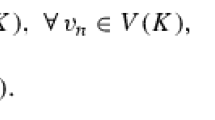Abstract
Newest vertex bisection (NVB) is a popular local mesh-refinement strategy for regular triangulations that consist of simplices. For the 2D case, we prove that the mesh-closure step of NVB, which preserves regularity of the triangulation, is quasi-optimal and that the corresponding L 2-projection onto lowest-order Courant finite elements (P1-FEM) is always H 1-stable. Throughout, no additional assumptions on the initial triangulation are imposed. Our analysis thus improves results of Binev et al. (Numer. Math. 97(2):219–268, 2004), Carstensen (Constr. Approx. 20(4):549–564, 2004), and Stevenson (Math. Comput. 77(261):227–241, 2008) in the sense that all assumptions of their theorems are removed. Consequently, our results relax the requirements under which adaptive finite element schemes can be mathematically guaranteed to convergence with quasi-optimal rates.




Similar content being viewed by others
References
Agouzal, A., Thomas, J.-M.: Une méthode d’éléments finis hybrides en décomposition de domaines. RAIRO, Modél. Math. Anal. Numér. 29(6), 749–764 (1995)
Aksoylu, B., Holst, M.: Optimality of multilevel preconditioners for local mesh refinement in three dimensions. SIAM J. Numer. Anal. 44(3), 1005–1025 (2006)
Aurada, M., Feischl, M., Kemetmüller, J., Page, M., Praetorius, D.: Each H 1/2-stable projection yields convergence and quasi-optimality of adaptive FEM with inhomogeneous Dirichlet data in \(\mathbb{R}^{d}\). ESAIM: M2AN (2013, accepted for publication)
Binev, P., Dahmen, W., DeVore, R.: Adaptive finite element methods with convergence rates. Numer. Math. 97(2), 219–268 (2004)
Bramble, J.H., Xu, J.: Some estimates for a weighted L 2 projection. Math. Comput. 56(194), 463–476 (1991)
Bramble, J.H., Pasciak, J.E., Steinbach, O.: On the stability of the L 2 projection in H 1(Ω). Math. Comput. 71(237), 147–156 (2002)
Carstensen, C.: Merging the Bramble–Pasciak–Steinbach and the Crouzeix–Thomée criterion for H 1-stability of the L 2-projection onto finite element spaces. Math. Comput. 71(237), 157–163 (2002)
Carstensen, C.: An adaptive mesh-refining algorithm allowing for an H 1 stable L 2 projection onto Courant finite element spaces. Constr. Approx. 20(4), 549–564 (2004)
Cascon, J.M., Kreuzer, C., Nochetto, R.H., Siebert, K.G.: Quasi-optimal convergence rate for an adaptive finite element method. SIAM J. Numer. Anal. 46(5), 2524–2550 (2008)
Clément, P.: Approximation by finite element functions using local regularization. RAIRO. Anal. Numér. 9(R-2), 77–84 (1975)
Crouzeix, M., Thomée, V.: The stability in L p and \(W^{1}_{p}\) of the L 2-projection onto finite element function spaces. Math. Comput. 48(178), 521–532 (1987)
Demlow, A., Stevenson, R.: Convergence and quasi-optimality of an adaptive finite element method for controlling L 2 errors. Numer. Math. 117(2), 185–218 (2011)
Eriksson, K., Johnson, C.: Adaptive finite element methods for parabolic problems. II. Optimal error estimates in L ∞ L 2 and L ∞ L ∞. SIAM J. Numer. Anal. 32(3), 706–740 (1995)
Feischl, M., Karkulik, M., Melenk, M., Praetorius, D.: Quasi-optimal convergence rate for an adaptive boundary element method. SIAM J. Numer. Anal. 51(2), 1327–1348 (2013)
Karkulik, M., Of, G., Praetorius, D.: Convergence of adaptive 3D-BEM for weakly singular integral equations based on isotropic mesh refinement. Numer. Methods Partial Differ. Equ. (2012, accepted for publication)
Karkulik, M., Pavlicek, D., Praetorius, D.: On 2D newest vertex bisection: Optimality of mesh-closure and H 1-stability of L 2-projection. ASC report 10/2012, Vienna University of Technology (2012). arXiv:1210.0367
Kossaczký, I.: A recursive approach to local mesh refinement in two and three dimensions. J. Comput. Appl. Math. 55(3), 275–288 (1994)
Maubach, J.M.: Local bisection refinement for n-simplicial grids generated by reflection. SIAM J. Sci. Comput. 16(1), 210–227 (1995)
Mitchell, W.F.: Adaptive refinement for arbitrary finite-element spaces with hierarchical bases. J. Comput. Appl. Math. 36(1), 65–78 (1991)
Morin, P., Nochetto, R.H., Siebert, K.G.: Data oscillation and convergence of adaptive FEM. SIAM J. Numer. Anal. 38(2), 466–488 (2000) (electronic)
Nochetto, R.H., Veeser, A.: Primer of adaptive finite element methods. In: Multiscale and Adaptivity: Modeling, Numerics and Applications, CIME Lectures (2011)
Nochetto, R.H., Siebert, K.G., Veeser, A.: Theory of adaptive finite element methods: an introduction. In: Multiscale, Nonlinear and Adaptive Approximation, pp. 409–542. Springer, Berlin (2009)
Quarteroni, A., Valli, A.: Numerical Approximation of Partial Differential Equations. Springer Series in Computational Mathematics, vol. 23. Springer, Berlin (1994)
Schulz, H., Steinbach, O.: A new a posteriori error estimator in adaptive direct boundary element methods. The Neumann problem. In: Multifield Problems, pp. 201–208. Springer, Berlin (2000)
Scott, L.R., Zhang, S.: Finite element interpolation of nonsmooth functions satisfying boundary conditions. Math. Comput. 54(190), 483–493 (1990)
Sewell, E.G.: Automatic generation of triangulations for piecewise polynomial approximation. Ph.D. thesis, Purdue University (1972)
Steinbach, O.: On a hybrid boundary element method. Numer. Math. 84(4), 679–695 (2000)
Steinbach, O.: On the stability of the L 2 projection in fractional Sobolev spaces. Numer. Math. 88(2), 367–379 (2001)
Steinbach, O., Wendland, W.L.: The construction of some efficient preconditioners in the boundary element method. Adv. Comput. Math. 9(1–2), 191–216 (1998). Numerical treatment of boundary integral equations
Stevenson, R.: Optimality of a standard adaptive finite element method. Found. Comput. Math. 7(2), 245–269 (2007)
Stevenson, R.: The completion of locally refined simplicial partitions created by bisection. Math. Comput. 77(261), 227–241 (2008)
Traxler, C.T.: An algorithm for adaptive mesh refinement in n dimensions. Computing 59(2), 115–137 (1997)
Tsogtgerel, G.: Adaptive boundary element methods with convergence rates. Numer. Math. (2012, accepted for publication)
Acknowledgements
The research of the authors M. Karkulik and D. Praetorius is supported through the FWF project Adaptive Boundary Element Method, funded by the Austrian Science Fund (FWF) under grant P21732, see http://www.asc.tuwien.ac.at/abem.
Author information
Authors and Affiliations
Corresponding author
Additional information
Communicated by Wolfgang Dahmen.
Dedicated to Carsten Carstensen on the occasion of his 50th birthday.
An erratum to this article is available at http://dx.doi.org/10.1007/s00365-015-9309-z.
Rights and permissions
About this article
Cite this article
Karkulik, M., Pavlicek, D. & Praetorius, D. On 2D Newest Vertex Bisection: Optimality of Mesh-Closure and H 1-Stability of L 2-Projection. Constr Approx 38, 213–234 (2013). https://doi.org/10.1007/s00365-013-9192-4
Received:
Revised:
Accepted:
Published:
Issue Date:
DOI: https://doi.org/10.1007/s00365-013-9192-4
Keywords
- Adaptive finite element methods
- Regular triangulations
- Newest vertex bisection
- L 2-Projection
- H 1-Stability




